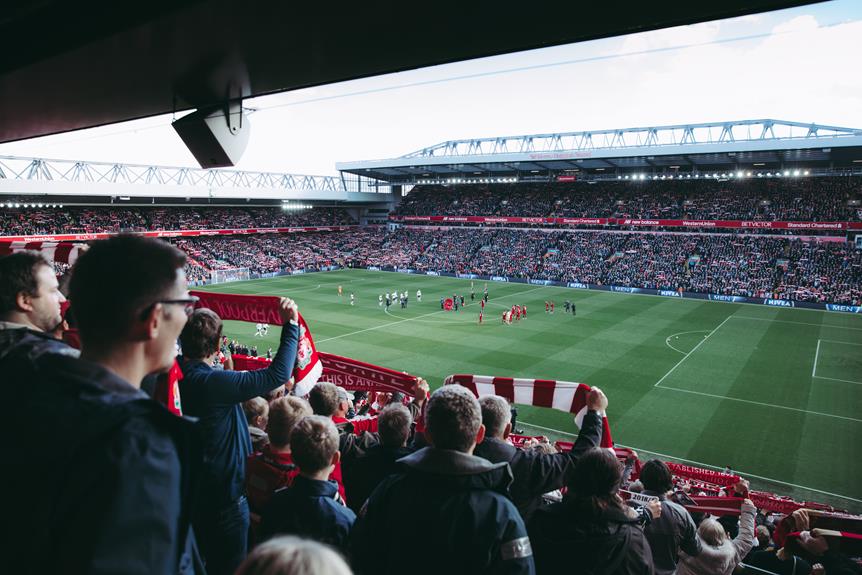In the intricate world of professional mixed martial arts (MMA), the title of interim champion holds significant weight. When the undisputed champion becomes inactive, an interim champion is appointed. This temporary reign is determined by UFC matchmakers, often not solely based on rankings.
Interim title fights arise due to various circumstances, ensuring continued competition and generating excitement and revenue for the UFC.
This article offers a simplified understanding of the role and implications of being an interim champion in the UFC.
Key Takeaways
- Interim champions in the UFC hold the interim championship title and belt while the undisputed champion is inactive.
- Interim champions are temporary and will be replaced when the defending champion returns to defend their belt.
- Interim champions are determined by the UFC matchmakers and are not necessarily the number 1 and 2 ranked fighters.
- Interim title fights can be caused by undisputed champion suspensions, contract disputes, injuries, or refusals to fight the next contender.
The Role of Interim Champions in the UFC
The role of interim champions in the UFC is to fill the void left by the absence of the defending champion and ensure the continuity of competition within the division. Interim champions play a crucial role in maintaining the excitement and integrity of the sport.
They step in when the undisputed champion is unable to compete due to various reasons such as injuries, suspensions, or contract disputes. Their importance lies in their ability to keep the division active and prevent it from becoming stagnant.
Interim champions not only provide entertainment for fans but also serve as a measuring stick for the top fighters in the division. They keep the competition alive and ensure that there is always a clear path to the title, even in the absence of the defending champion.
How Interim Champions Are Determined in the UFC
When determining interim champions in the UFC, matchmakers consider various factors such as fighters' rankings, recent performances, and their ability to generate interest and excitement among fans. These decisions are not taken lightly and are subject to intense scrutiny and debate within the MMA community.
Controversy often surrounds the process of determining interim champions, with critics questioning the legitimacy and necessity of these temporary titles. However, it is important to understand that interim champions play a crucial role in maintaining the integrity and competitiveness of UFC divisions. They ensure that divisions do not stagnate and provide opportunities for deserving fighters to showcase their skills and challenge for the undisputed championship.
While controversy may persist, the determination of interim champions ultimately rests in the hands of the UFC matchmakers, who strive to make the fairest and most compelling matchups for both fighters and fans alike.
The Distinction Between Interim Champions and Undisputed Champions
One key distinction between interim champions and undisputed champions in the UFC lies in their permanence in holding the title. While undisputed champions are the recognized and long-term titleholders, interim champions hold the title temporarily in the absence of the defending champion. This distinction highlights the vulnerability of interim champions compared to undisputed champions.
To further illustrate this difference, let's take a look at the following table:
| Interim Champions | Undisputed Champions |
|---|---|
| Temporary titleholders | Recognized long-term titleholders |
| Hold the title in the absence of the defending champion | Defend the title against top contenders |
| Subject to replacement if inactive | Protected while inactive |
| Key role in title unification | Defend the title to maintain undisputed status |
This table visually represents the contrasting roles and vulnerabilities of interim champions and undisputed champions in the UFC. While interim champions play a crucial role in title unification, their status is temporary and subject to replacement if they become inactive. On the other hand, undisputed champions are recognized as the long-term titleholders and enjoy the protection afforded to them while inactive.
Reasons for Interim Title Fights in the UFC
Several factors contribute to the occurrence of interim title fights in the UFC. These fights serve multiple purposes and have gained both praise and criticism within the MMA community. Here are some reasons for having interim champions in the UFC:
- Business: Interim title fights create more Pay-Per-View events and increase revenue for the promotion.
- Leverage: The UFC can use interim title fights as a tool to pressure defending champions in contract disputes, ensuring they remain active and committed.
- Entertainment: Interim title fights keep fans engaged and prevent divisions from going stale by providing exciting matchups and storylines.
While interim champions play a crucial role in the UFC, controversy surrounds their legitimacy. Some argue that they devalue the significance of the undisputed title and confuse the hierarchy of divisions. Nonetheless, interim champions continue to serve a purpose in the sport, providing opportunities for deserving fighters and adding intrigue to the MMA landscape.
The Business Impact of Interim Champions in the UFC
The UFC's business landscape is significantly impacted by the presence of interim champions. Interim title fights create more pay-per-view events, increasing revenue for the promotion. These fights generate excitement among fans and attract a larger audience, resulting in higher ticket sales and merchandise purchases.
Moreover, interim champions provide leverage for the UFC in fighter contract negotiations. The organization can use the creation of an interim title to pressure defending champions into resolving contract disputes or accepting more favorable terms.
Additionally, interim champions have a direct impact on fighter contracts. Their success and popularity can lead to increased bargaining power when negotiating future fights and sponsorship deals.
The Entertainment Value of Interim Title Fights
Interim title fights, while controversial at times, offer a captivating blend of uncertainty and high stakes for UFC fans. These fights provide an element of excitement that keeps fans engaged and invested in the outcome.
Here are three reasons why interim title fights hold significant fan appeal:
- Unpredictability: Interim title fights introduce an element of unpredictability, as they often involve fighters who may not have been initially expected to contend for the championship. This adds an extra layer of excitement and anticipation for fans.
- High Stakes: Interim title fights carry a sense of urgency and importance. The fighters involved understand that a victory could potentially lead to a shot at the undisputed championship. This heightened level of significance raises the stakes and intensifies the competition.
- Division Rankings: Interim champions have a direct impact on division rankings. Their victories can shake up the rankings, forcing other contenders to reevaluate their positions and strive for a chance to challenge the interim champion. This dynamic keeps divisions competitive and ensures that top fighters continue to push themselves to earn a title shot.
The Significance of Interim Champions in UFC Matchmaking
With their ability to fill the void left by inactive defending champions, interim champions play a crucial role in the UFC matchmaking process. When a defending champion is unable to compete due to injury, suspension, or contract disputes, an interim champion is crowned to maintain the division's momentum.
The role of the interim champion is to keep the division active by defending the interim title against the top contenders in the division. However, the presence of interim champions in UFC matchmaking has not been without controversy. Critics argue that it dilutes the value of the undisputed championship and can create confusion among fans.
Nevertheless, the significance of interim champions cannot be denied, as they provide a temporary solution and ensure that the division continues to thrive until the return of the defending champion.
The Controversy Surrounding Interim Champions in the UFC
Controversially, some critics argue that interim champions in the UFC often create confusion and dilute the significance of the undisputed championship. This controversy stems from the impact of interim champions on division rankings.
Here are three key points that contribute to the controversy:
- Lack of clarity: The presence of an interim champion can lead to confusion among fans and fighters about who the true champion is. This ambiguity can undermine the integrity of the title and the division as a whole.
- Dilution of the undisputed title: With the introduction of interim champions, the value and prestige of the undisputed championship can be diminished. Some argue that having multiple champions within a division dilutes the significance of being the sole undisputed titleholder.
- Inconsistency in division rankings: The creation of interim champions can disrupt the established rankings within a division. This can lead to situations where fighters who have not yet earned a title shot are given the opportunity to fight for an interim belt instead.
The controversy surrounding interim champions in the UFC is a complex issue that continues to spark debate among fans, fighters, and analysts alike. While interim champions serve a purpose in keeping divisions active, their impact on division rankings and the clarity of the undisputed championship remains a point of contention.
The Future of Interim Champions in the UFC
Despite the ongoing controversy surrounding interim champions in the UFC, the future of their presence in the organization seems inevitable. Interim champions have played a significant role in the UFC, serving as temporary titleholders when the undisputed champions are unable to defend their belts. However, there have been discussions about potential changes to the system and the implications they may have.
One potential change could be a reevaluation of the criteria for establishing interim champions. Currently, the UFC matchmakers determine the two fighters most deserving of the opportunity, but there have been instances where the rankings and contendership have been questioned. Implementing a more objective and transparent process could address these concerns.
Another potential change could be the frequency of interim title fights. While these fights create more PPV events and revenue for the organization, some argue that they diminish the value of the undisputed title. Finding a balance between maintaining fan engagement and ensuring the integrity of the championship could be a consideration for the future.
The implications of these potential changes are significant. A more rigorous process for establishing interim champions could enhance the legitimacy of their titles and prevent controversies. It could also lead to more deserving fighters getting a shot at the interim championship. Additionally, a careful evaluation of the frequency of interim title fights would ensure that the undisputed champions' status is not undermined and that the interim titles hold greater significance.
What is the Purpose of Weight Limits in UFC Heavyweight Division?
The purpose of weight limits in the UFC heavyweight division is to ensure fair competition and minimize advantages gained from excessive weight. The ufc heavyweight weight limit simplified is set at 265 pounds, aiming to create a level playing field and prevent potential safety risks resulting from significant weight disparities. Complying with these regulations helps maintain the integrity of the sport and protect the fighters.
Conclusion
In conclusion, the role of interim champions in the UFC is a significant one, ensuring the continuation of competition in respective divisions when the undisputed champion becomes inactive.
Interim champions are determined by UFC matchmakers and may not necessarily be the top-ranked contenders.
While they hold a temporary reign, interim champions add excitement and revenue-generation to the organization.
Despite occasional criticism, the presence of interim champions is expected to persist in the dynamic landscape of the UFC.
- 15 Best Martial Arts Weapons (Fighting & Training) - October 14, 2024
- Is Fencing a Martial Art? (Yes, 4 Reasons Why) - October 14, 2024
- 7 Best Martial Arts for Self-defense Ranked (Highly Effective) - October 14, 2024










